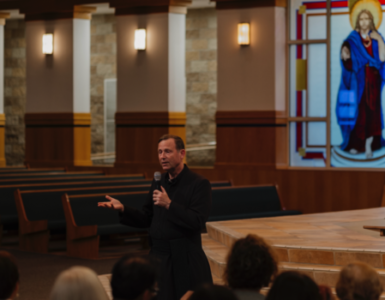As Catholics, we are entrusted with the responsibility of bringing our faith into the public square. Yet, as this election season unfolds, political discourse seems to have lost its moral compass, focusing more on defeating enemies than building a just society. Drawing on the wisdom of St. John Paul II, we must ask: how can we restore the Catholic principles of solidarity, subsidiarity, and the common good in a political climate that thrives on division?
John Paul II, one of the most influential thinkers of the 20th century, offers a path forward. His theological teachings—especially those on human dignity, truth, and the sanctity of life—provide a framework for navigating today’s polarized political landscape. Rather than seeing politics as an arena for domination, John Paul II reminds us that it is a means to secure justice and uphold the dignity of every human being. His insights, found in works like Centesimus Annus and Evangelium Vitae, call us to a higher standard of political engagement, one that is rooted in respect for truth and the personhood of all, including those with whom we disagree.
The Call for Solidarity
At the heart of John Paul II’s teachings is the principle of solidarity, a recognition that we are all interconnected and responsible for the well-being of one another. In Centesimus Annus, he writes:
Solidarity is not a feeling of vague compassion or shallow distress at the misfortunes of so many people, both near and far. On the contrary, it is a firm and persevering determination to commit oneself to the common good; that is to say, to the good of all and of each individual, because we are all really responsible for all.
This understanding of solidarity stands in stark contrast to the current political climate, where opponents are often treated as enemies to be vanquished. Instead of seeking to work together for the common good, political factions frequently focus on scoring points and tearing each other down. But if we take John Paul II’s teachings to heart, we recognize that even in political disagreement, there is a shared responsibility to uphold each other’s dignity.
This doesn’t mean abandoning our convictions or ignoring real political differences. Rather, it calls us to engage in political debates in a manner that respects the humanity of our opponents. This is not a weakness but a strength, rooted in the conviction that politics, when done rightly, is about achieving justice for all.
Truth as the Foundation of Freedom
John Paul II’s emphasis on the relationship between truth and freedom also offers critical insights for today’s political environment. In Centesimus Annus, he argues that authentic freedom is not the ability to do whatever one wants, but rather the ability to pursue what is good and true. He writes, “Freedom attains its full development only by accepting the truth.”
In the context of political discourse, this means that truth should be the foundation of all political activity. Yet, in today’s media-saturated culture, where sensationalism often trumps substance, truth is frequently sacrificed in favor of what is expedient or popular. Political leaders and commentators alike too often engage in the distortion of facts, not in the service of truth, but to manipulate public opinion and win votes.
John Paul II warns against this kind of relativism, where truth becomes secondary to power. He insists that real freedom can only be found in the pursuit of truth, a principle that is especially important for those in political leadership. In a democracy, the health of the political system depends on leaders and citizens alike being committed to seeking the truth, even when it is uncomfortable or challenges our preconceived notions.
The Dignity of the Human Person
Perhaps the most profound aspect of John Paul II’s theology, particularly as articulated in Evangelium Vitae, is his insistence on the dignity of the human person. This teaching is not only a cornerstone of Catholic theology but a challenge to how we engage in political life. Politics, in John Paul II’s view, must always serve the dignity of every human person, from conception to natural death. This means that even those we oppose politically must be treated with respect and dignity.
In Evangelium Vitae, John Paul II writes, “The dignity of the person is not only a substantive principle but also a moral and theological foundation for building a just society.” This teaching calls into question the dehumanizing tactics that have become all too common in modern politics. When we reduce our opponents to caricatures or view them as obstacles to be destroyed, we undermine the very foundation of a just society.
In today’s world, social media and 24-hour news cycles encourage the dehumanization of political opponents. Politicians and pundits alike use inflammatory language to stoke division and rally their bases, often at the expense of the common good. But if we truly believe in the dignity of the human person, as John Paul II teaches, we must reject these tactics and instead engage in political debates that reflect our shared humanity.
Civility as a Moral Imperative
John Paul II’s call for civility in politics is not just about manners; it is a moral imperative rooted in the recognition of human dignity. In Centesimus Annus, he warns that when politics becomes disconnected from moral principles, it devolves into a struggle for power that undermines the common good. Civility, therefore, is not a superficial concern, but a necessary condition for achieving justice and human flourishing.
Imagine a political system where victory is achieved at the cost of tearing apart the social fabric. The short-term gains of winning an election would be far outweighed by the long-term consequences of a society divided by bitterness and animosity. John Paul II’s teachings remind us that how we engage in politics is just as important as the outcomes we seek. Political charity, which he defines as “a spirit of openness to others and a commitment to justice,” is essential for maintaining the integrity of both our political system and our society.
Conclusion: A Politics of Human Dignity
As we enter another election season, we are called to reflect on what kind of society we want to build. John Paul II’s teachings challenge us to see politics not as a zero-sum game, but as an opportunity to work together for the common good. His emphasis on solidarity, truth, and the dignity of the human person offers a roadmap for navigating the turbulent waters of modern political discourse.
If we take these teachings seriously, we will not only engage in politics with greater civility but also build a more just and humane society. The true measure of political engagement, as John Paul II reminds us, is not just who wins or loses, but whether our actions uphold the dignity of every human being. In the end, if we fail to treat one another with respect, what is the point of winning at all?
Photo by Nik Shuliahin 💛💙 on Unsplash












